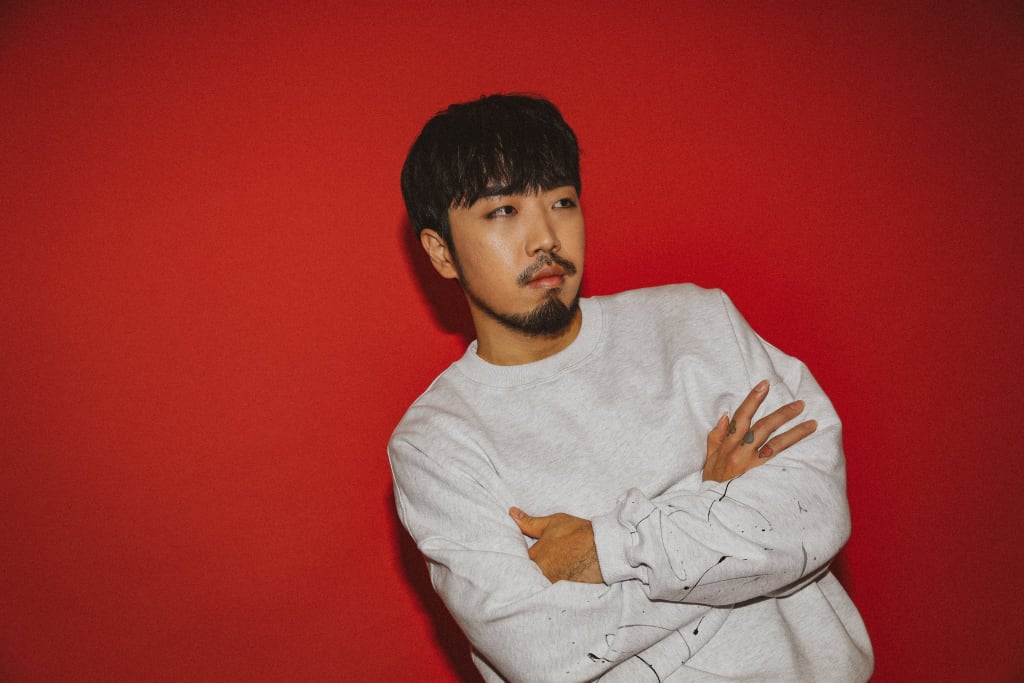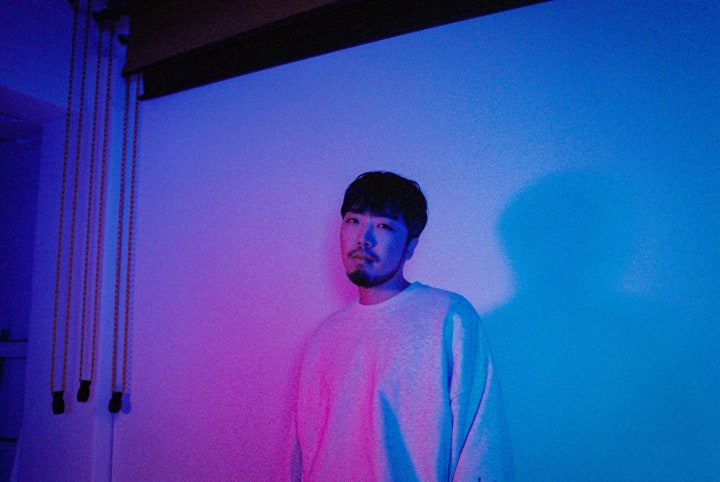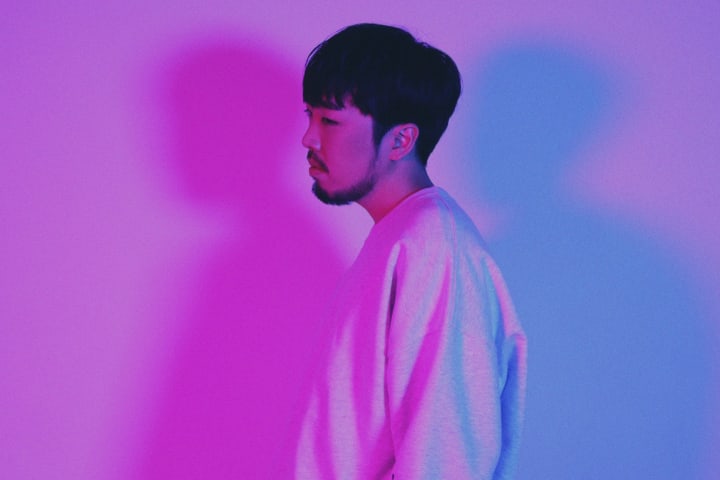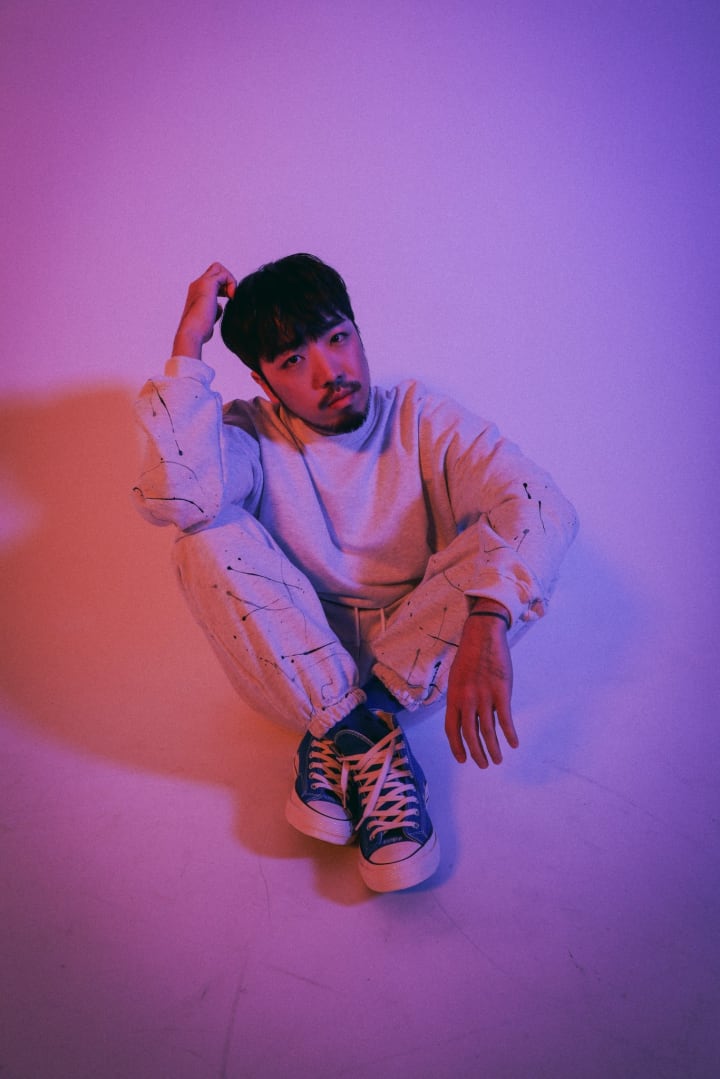LambC Interview: The Singer-Songwriter Discusses His Approach to Music, Recent Single, and More
LambC's latest single, "Jelly," is out now through Happy Robot Records.

It's fair to say that if you're not tuned in to what LambC is doing, you are missing out. From the catchy "Treat You Right," which bristles with a jazzy flair as its rippling bassline and partially falsetto chorus entice the listener, right the way to the attention-grabbing "Love Like That," a warm, melodious pop ballad, there's always been an evident air of unbridled creativity within the singer-songwriter's music. Undeniably a jack of all trades, the consummate self-production omnipresent in each and every track is the hallmark of the gem of a talent, and the consistent growth evident with each passing release a sign of forever exciting, expanding potential.
But right now, it's time for a new kind of challenge for LambC: a first full-length album. Set for release in April and titled I'll see you when I see you, it marks a departure from the short-form efforts synonymous with the artist, building on the sonic foundations laid previously with expanded horizons, and plenty of room for genre-bending.
The latter part in particular is evident across the three pre-released singles, with "Emotional" operating as a sleek, keyboard-led, airy love song which builds to a spacious, sonically rich climax, "When my Heart breaks" a colourful, energetic pop-rock anthem syringed with a thumping staccato pre-chorus and wiry guitar-flanked hook, whilst the newly released "Jelly" gives a hearty dose of pop minimalism courtesy of its understated rhythm guitar melody and soothingly restrained vocal performance.
Ahead of his album's release, we were fortunate enough to talk to LambC about his creative process, musical direction and plenty more.
*This interview was conducted before the release of "Jelly," and some comments have been edited for clarity*

Nathan Sartain: First of all, congratulations on your single, “When My Heart Breaks.” How does it feel to have it out in the world?
LambC: It feels good; I’ve been working on this project for a little while now and for me personally, once I get into my album mode, I usually have all my time invested in it. So it’s freeing, I guess I should say, now that my single is out. And I’ve done all my masters (for the album) last week so I’m pretty much free now. I’m a happy man!
And of course the single is a change of style from your usual work. Did you have any nerves about releasing the track given how different it is from some of your other songs?
I talked about styles and genres of music with my teammates and my labelmates, but for me I don’t think I’ve had a particular genre, to say. So every time I release an album or a single, I personally felt that I was evolving as my tastes grew, and as I grew older. I did want to try a more alternative/pop-rock kind of tune, and this is a much better project to showcase that. For me personally, I would rather have a different variety of sounds and tones, just so that I could also level up my producing chops.
Nowadays, with the way music is going, it seems to be that a lot of people embrace more styles, too. Do you think it’s important that you can keep up with these methods and make sure you can adjust and release, for example, a mellow-pop song, but then also a pop-rock track with a bit more energy?
Yeah. This would be different for each artist, but for me I followed musicians and artists who always had something more to give to the audience, rather than staying put to certain genres or sounds. For example, I know a lot of things had been said when Linkin Park did more pop tunes when they started out as more heavy rock, and Maroon 5 started out as a band but then switched to more of a pop sound. But in the end, it was those kind of bands that I felt connected with because times change, sounds change, and I feel it’s the responsibility of the artist to also adapt to new styles of music. That’s my approach, other artists might not agree, but that’s me.
We also have to talk about your new music video, which is quite interesting and quirky to say the least. You happened to direct that yourself, could you talk us through it please?
Well, obviously because of the COVID-19 situation, a lot of people want to spend less, and I decided and told my labelmates ‘let’s try and make something with zero budget and just hash out on our own’, and I had this screen-recording idea of my pro-tools session. I probably did like twenty takes of it because I messed up in between, but I wanted to do a green-screen and then pop it in depending on how the music was sounding. It was really detailed, the most detailed (thing) I’ve ever directed, so it was really quick, about a week from the recording to the edits. It was fun.
Do you think then, with that in mind, that to make a good music video, you just need a good idea, rather than a blockbuster budget?
Of course. You could pay all the money you want, but end up with a video that doesn’t have a certain message, or is visually appealing with no message. I personally have been brought up with very limited resources, so I used to try and make the best out of what I had in the moment, and what I had in this moment was for me and the team to try to create something more creative, rather than ‘let’s spend this amount of money’. I think we went on the right path for this one, yeah.
Lyrically, the track is about heartbreak, which is the same with your prior single "Emotional." Is that where you’re going, thematically, for your full-length album?
I would say that most of my music is related to love, be it either heartbreak, or a love song, or a jealousy song. I think that’s just how I write and compose as an artist, because at the end of the day I feel like we still as human beings want to be loved or are in search of a certain type of love. I feel like most of my other releases will be related to love, just off the top of my head, so that’s why I wanted to do something different with my previous album.
And then, to expand on that, what is it that inspires you when you write a song, whether musical or otherwise?
The funny thing is for me, I can’t sit down and decide that I’ll be writing a song today, it just doesn’t come up that way. Some people can literally sit down and (are like) ‘ok I’m gonna write a song today’ and just make one. For me, that’s not the case, and so whenever inspiration hits, I have to give up on everything and anything I do, and try to record that, or jot it down on notes. It might even spring up whilst we’re talking, and then I might have to give up on this interview (laughs). So sometimes I get inspiration from taking photos, sometimes in a cafe. Inspiration is everywhere. I know that sounds really cringeworthy, but my job as an artist is to record it, and take notes so that I don’t forget when it’s actually time to record it properly.
During the pandemic, then, has it been a challenge to stay inspired, and ensure that you don’t just say the same things as everyone else, such as being at home, or being bored?
Yeah, yeah (laughs). That was really difficult because every artist wants to say something, and give a definitive message to their listeners, and for me it was similar. For me, my previous album ‘songs from a bed’ was about me being at home, stuck because of COVID, so for this album I tried to be free of that and act as normal as possible, meaning that I didn’t shy away from writing things that hit me on a very personal level where a lot of other people can also feel connected. That includes love and togetherness. I also have a song about the frustrations of COVID-19 which is going to come out when the album drops, but as a writer, I think it (the pandemic) didn’t impact me as much because I did write a hell of a lot of songs during that period because I was staying at home too much, and drinking coffee too much. But yeah, I tried not to shy away from composing, and basically wrote everything that I got inspired by.
You did touch on Songs From a Bed, which of course was released at one height of the pandemic in the summer months last year. When you look at that now, and compare it to your upcoming release, what do you think the development has been like, musically?
I personally feel that this upcoming album is the ‘poppiest’ compared to my previous albums. One thing very special about it, in particular, is that I’ve co-written and co-produced with another songwriter from Berkeley, where I used to live back in school days. I usually don’t co-write because we get into a lot of arguments about how songwriting should be, but then with this friend of mine we clicked very well, and that’s how the whole album project came to be. I feel that I got the best out of him, he got the best out of me, and we grew into making songs that sounded best to our ears, and that resulted in a very pop sound. “Emotional” and “When My Heart Breaks” are just the tip of the iceberg, I would say. Once the album drops I think listeners can also feel that it’s a different kind of LambC, if you know what I mean?
In general, you basically do everything (writing, producing, mastering) when it comes to your music. How important is it to you that you retain a sense of individuality over your work?
I think that’s the most important part of who I am as an artist. I have a great label, I have a great working team, but no matter how great (it is), I feel like the only person that would love your music as much as you is just yourself. They wouldn’t love my music more than me, so in order for me to have that control of ‘oh I know how I want to sound like, I know where I want to target, I know what direction I want to go to’ is all part of my artistry. So I get to make mixing decisions, I get to make recording decisions, mastering decisions, and they’re all just compiled into LambC’s signature sound. I feel like that part is the most crucial for me, and I think I would want to keep it that way for as long as possible.
So then, when it did come to co-writing on this album, did you make sure that your styles were complementary, rather than from a completely different perspective?
Yes. I think for this to work, it was (necessary) for us to have a very high mutual respect of each other’s songwriting and producing skills. Interestingly enough it was really easy to co-produce with this friend of mine. Whenever I was stuck on a part he would come up with something, and it just sounded good, and I had no reason to say ‘no, I don’t like this’ or he didn’t have any reason for him to not like what I did. So I think it was a good combination, and (we have) a good chemistry that built itself back in Berkeley days.
Of course, you also formed a band, MOTIP, recently. Does that then allow you to satisfy other creative needs that you can’t in your solo music?
Yes. The first instrument I ever picked up was a trumpet, but then the first instrument that I really had passion for was the drums. I started off playing rock; I listened to a lot of (bands) like Muse, a lot of Radiohead, indie bands like Minus the Bear, so I’ve always had that passion of wanting to be a drummer as well as a frontman. One of the members, the guitarist, is the person who co-produced my upcoming album, so I kind of had people that I wanted to form a band with, and it fell naturally in place. Like you said, I get to do what I can’t do in my artistry, and get to satisfy my other satisfaction for rock music, and pop, hi-fi music with my band. I think it’s a very good balance.
How does the recording process change then, when you’re in a band compared to when you’re doing music for yourself?
I think this kinda goes for a lot of other bands as well, but for MOTIP we get together, jam a little and (then) we come up with mostly riffs, and then melodies on top, and then lyrics together. So it’s kind of more everyone does their job. I do a lot of the recording process. I do all of the mix and mastering process, and the other members do what is required as well, including songwriting, marketing, branding, all that stuff. So that is that, and for me and my own LambC songs, I usually just do everything at home; recording at home, mixing and mastering at home, songwriting at home, but I think both of them have their own perks. For MOTIP I don’t have to stress out to write a good song, because all the other members can do that as well, so that’s fun (laughs). I just need to put on a good groove and they’ll write good songs.
To circle back, you are currently planning for your first full-length album. Has that drawn up any challenges?
Definitely. The most I’ve done is six songs per EP, and that was challenging enough because I do everything on my own, and I wanted to do everything on my own, but doing twice as many songs within the same period of time was very challenging. I like to go back-and-forth and listen back to my masters and mixes a lot, but then because the workload was twice as much and the timescale was the same, I did have a lot of difficulties. But in the end I feel like I always put myself in a very uncomfortable situation, every single time, I don’t know why. If I don’t do that, I kind of stop making music, or I stop writing. It was difficult, but worth it.
In a similar vein, how did the selection process work then, with this record? And did you find yourself having to quickly plan, or scrap songs, given the tight deadlines?
So, I plan out songs, then I would pick out songs that I’ve written and I’ll try and compile it into an album and also put them in order, and listen to them and see and hear if it feels right. But then if some songs don’t click, I get rid of them and write new songs. Like one week before the masters that I had to give (were due), there was this one song that I couldn’t live with, and it was a week before deadline, so I just thought ‘you know what? Screw this, I’m going to write a new song’ and I wrote a new song from scratch and put it in the album. That has happened like three times while making this album, so it was difficult, but worth it because now I feel a bit more satisfied, and a bit more proud to showcase this project.
Do you ever get the feeling when you have a song and think ‘this is it, this is such a good track’, and then you go into the recording phase and it just doesn’t manifest as anything, or by the same token, the opposite?
(Laughs) Yeah! It does happen, it’s weird. Sometimes I feel like it’s a shitty song, but once I record it, it sounds fine, and better than what I expected. I think it’s just about trying it out, and a habit of mine is that if I write a song, and if it’s recorded in my phone, I try my best to record a good demo at least to hear how it’s going to sound, what I can add on top or what I can take out. And if it doesn’t make the first cut, if I don’t feel it by the first time I hear the demo, then I just take it out. That’s just how I work.
Moving on, do you get welcome outside influence with your music? Like do you ever invite people into the studio and ask ‘how’s this?’, or do you trust your instincts?
I think the first step for me as an artist is to enjoy the music as if I was the listener. And then I would invite family members and my close friends to listen to the song and see how they feel about it. I’ll get good feedback, like ‘oh I think this part of the song needs to be a little more elevated, or a little bit more toned down’, and I would, with open ears, listen to it again. If I feel that’s the right decision to make, then I will just tone it down or elevate it more. So yeah I do have the process of trying to get friends, who are also just music lovers, not musicians, to come around. I basically go to them like ‘yo yo yo here’s my new song’ and put my airpods in their faces (laughs), and let them listen.

To talk more generally, you have mentioned your past in Berkeley a couple of times. How did being in the US for the time you were end up impacting your music when you came back to Korea?
It’s safe to say that it was everything. I grew up listening to (western) pop music more than Korean music, because I wasn’t in Korea in my teenage years, I was in Malaysia. And when I went to Berkeley, everywhere I went had a live show, so I think Berkeley really gave me the tools to be able to expand my limits. I got exposed to a lot of different genres, a lot of different sounds. Just looking at the live performances inspired me to get better, and when my Berkeley days were over and I came to Korea, I unconsciously tried to make music that sounded best to my ears, and it had a lot to do with when I was learning from Berkeley. I always talk about how I want to go back to Boston when I’m old (laughs), because I had such a great time there.
To move on away from music, what do you find yourself up to now, in your free time now that you have finished your mastering?
I’ve gone back to dieting, because I gained a lot of weight (laughs). So I’m going to the gym more often now. Sadly, I used to take a lot of film photography, but then right now whenever I go out everyone is wearing masks and it’s not as fun to be shooting film these days. So, a lot of gym, a lot of YouTube, a lot of stock market excitement (laughs). Everyone is in stocks in Korea, so I’m on that too. Nothing out of the norm, I think.
Of course, we are still in the infancy of 2021. Going forward, what do you want to do so that you can say that it’s been a success?
I think, personally, I’m not someone who demands an amount of fame, or followers. I really just started out doing music because of the love of creating, the love of music. Literally this was my mindset when I first started out: ‘I wish even just one person would listen to my music, because I really like it a lot’. And so, I still have that mindset, and I feel like if people like what they hear, all the popularity and followings will come in time. But for me, to define success as an artist, is me making good music, me being healthy, me doing what I love the most. I wouldn’t know what I would do without making music, so success is very relative. That’s my definition of success.
Given that you mentioned your mindset, how touching then is that that in this age of music, you’ve found yourself with fans from all over the world?
I think it’s crucial. I always tell my labelmates that I don’t want to be just making music in Korea because I’m physically in Korea, I want my music to be online and international. That’s just how I write songs, and I write about whatever inspires me at that moment in time. And so having the internet and social media is huge, although I really suck at social media. I try to be as active on social media, on Instagram and stuff, but I’m just not that type of person. But I do try my best.
Does that then mean that you have to adapt a bit, to connect with fans?
Yes. I think social media trends change really fast. New apps come out every single day. Personally I would want to not care about social media, and just try to make good music, but what’s the point of making good music if none of it is going to be heard. So yes as an artist I do try and adapt, but at the moment my focus is trying to make good music, and then follow up with social media, rather than go the opposite way round. Because that way I might lose the most important factor of creating music, but it (social media) is hard. Any tips on how to be better at social media are always welcome.
Just before we wrap up. Going forward past the full-length album, is there anything else in the pipeline?
For now, we are focused on getting the whole album out, and then we’ll try and build on from there, because there’s so much uncertainty at the moment. Like even just having to perform live, whether we can do that or not, will decide how we should approach our next project, or how we should approach our next single, or just how we do anything in general. So yeah, we’re kind of more focused on the album at the moment, and the more songs, the sooner you’re going to see me.
And finally, is there anything else you’d like to add?
First of all, thank you for having me, and also to everyone who is listening, thank you so much. The full album is about to drop, and there are a few surprises, so please stay tuned and yeah, hopefully you will like the album as much as I did.

LambC's new single, "Jelly," is out now on Happy Robot Records.






Comments
There are no comments for this story
Be the first to respond and start the conversation.